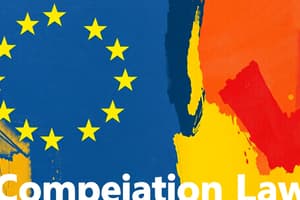Podcast
Questions and Answers
What is the primary legal basis referenced in the preliminary ruling?
What is the primary legal basis referenced in the preliminary ruling?
- Council Regulation (EC) No 1/2002
- Article 82 EC
- Council Regulation (EC) No 1/2003 (correct)
- Article 80 EC
Which of the following entities provided legal representation in this matter?
Which of the following entities provided legal representation in this matter?
- Siemens AG Österreich (correct)
- Samsung Electronics
- Northrop Grumman
- General Electric
What aspect of competition law is particularly discussed in the judgment?
What aspect of competition law is particularly discussed in the judgment?
- Article 81 and 84 of the EC Treaty
- Rules on anti-competitive agreements (correct)
- Implementation rules on merger control
- Regulations on market dominance
Which government agency acted as agents for the Czech Government?
Which government agency acted as agents for the Czech Government?
At which sitting was the Opinion of the Advocate General given?
At which sitting was the Opinion of the Advocate General given?
Which company was represented by advokát M.Nedelka?
Which company was represented by advokát M.Nedelka?
What is the primary focus of Article 81 EC as referenced in the judgment?
What is the primary focus of Article 81 EC as referenced in the judgment?
What does the Commission Notice emphasize within the context of competition authorities?
What does the Commission Notice emphasize within the context of competition authorities?
What is prohibited under Article 3(1) of the Law on the Protection of Competition?
What is prohibited under Article 3(1) of the Law on the Protection of Competition?
Until what date did the provisions of Article 3(1) of Law No 143/2001 Sb. remain unchanged?
Until what date did the provisions of Article 3(1) of Law No 143/2001 Sb. remain unchanged?
What was the international cartel mentioned in the case primarily concerned with?
What was the international cartel mentioned in the case primarily concerned with?
Who imposed fines on the undertakings involved in the GIS cartel?
Who imposed fines on the undertakings involved in the GIS cartel?
When did the Commission inform the Úřad pro ochranu hospodářské soutěže about the intended proceeding regarding the cartel?
When did the Commission inform the Úřad pro ochranu hospodářské soutěže about the intended proceeding regarding the cartel?
Which articles did the Commission base its proceedings for imposing fines on in 2006?
Which articles did the Commission base its proceedings for imposing fines on in 2006?
What aspect of competition did the administrative procedure at EU level concern?
What aspect of competition did the administrative procedure at EU level concern?
What is one possible outcome described for agreements that restrict competition?
What is one possible outcome described for agreements that restrict competition?
What does Article 16(2) of Regulation No 1/2003 specify about national authorities?
What does Article 16(2) of Regulation No 1/2003 specify about national authorities?
Under what condition can national competition authorities apply their national law?
Under what condition can national competition authorities apply their national law?
Which of the following best describes the scope of Article 16(2) of Regulation No 1/2003?
Which of the following best describes the scope of Article 16(2) of Regulation No 1/2003?
What happens to the power of national competition authorities after a proceeding initiated by the Commission is concluded?
What happens to the power of national competition authorities after a proceeding initiated by the Commission is concluded?
How do EU law and national law on competition operate in relation to each other?
How do EU law and national law on competition operate in relation to each other?
What is the primary purpose of allowing a competition authority to suspend or close a case?
What is the primary purpose of allowing a competition authority to suspend or close a case?
What is a misconception about the application of national competition law by authorities?
What is a misconception about the application of national competition law by authorities?
What does Regulation No 1/2003 allow regarding EU competition law and national legislation?
What does Regulation No 1/2003 allow regarding EU competition law and national legislation?
How should cases be generally handled according to the provided regulations?
How should cases be generally handled according to the provided regulations?
In cases where a cartel or abuse of dominant position affects trade between Member States, which laws apply according to Regulation No 1/2003?
In cases where a cartel or abuse of dominant position affects trade between Member States, which laws apply according to Regulation No 1/2003?
What does a fortiori mean in the context of the regulation?
What does a fortiori mean in the context of the regulation?
What must national competition authorities avoid when ruling on matters already addressed by the Commission?
What must national competition authorities avoid when ruling on matters already addressed by the Commission?
In relation to the handling of competition cases, what does the principle of a single authority imply?
In relation to the handling of competition cases, what does the principle of a single authority imply?
Which aspects of competition law do EU and national laws view differently?
Which aspects of competition law do EU and national laws view differently?
What was a significant change regarding the handling of competition cases as outlined in Registration No 1/2003?
What was a significant change regarding the handling of competition cases as outlined in Registration No 1/2003?
Under what condition can national competition authorities still take action on a competition issue?
Under what condition can national competition authorities still take action on a competition issue?
What principle is highlighted regarding the retroactive application of penalties in competition law?
What principle is highlighted regarding the retroactive application of penalties in competition law?
What do the companies involved in the proceedings actually seek regarding the cartel effects before May 1, 2004?
What do the companies involved in the proceedings actually seek regarding the cartel effects before May 1, 2004?
How does the Advocate General view the companies' arguments concerning retroactive application?
How does the Advocate General view the companies' arguments concerning retroactive application?
What must be interpreted about Article 81 EC in relation to cartels producing effects before May 1, 2004?
What must be interpreted about Article 81 EC in relation to cartels producing effects before May 1, 2004?
What does the companies' argument infer about the powers of the Úřad pro ochranu hospodářské soutěže?
What does the companies' argument infer about the powers of the Úřad pro ochranu hospodářské soutěže?
Which article is linked to the principle of ne bis in idem in this context?
Which article is linked to the principle of ne bis in idem in this context?
What is a key characteristic of the constitutional traditions of the Member States regarding penalties?
What is a key characteristic of the constitutional traditions of the Member States regarding penalties?
What does the opening of a proceeding against a cartel by the Commission under Article 11(6) of Regulation No 1/2003 imply for national competition authorities?
What does the opening of a proceeding against a cartel by the Commission under Article 11(6) of Regulation No 1/2003 imply for national competition authorities?
What is the significance of the date May 1, 2004, in this legal context?
What is the significance of the date May 1, 2004, in this legal context?
Which principle is relevant when considering the imposition of fines under competition law?
Which principle is relevant when considering the imposition of fines under competition law?
Under what condition does the ne bis in idem principle prohibit further proceedings against an undertaking?
Under what condition does the ne bis in idem principle prohibit further proceedings against an undertaking?
Does the ne bis in idem principle apply based on the date of the anti-competitive conduct or the opening of proceedings?
Does the ne bis in idem principle apply based on the date of the anti-competitive conduct or the opening of proceedings?
What was the significance of the timing of decisions made by national authorities regarding fines?
What was the significance of the timing of decisions made by national authorities regarding fines?
Which articles of Regulation No 1/2003 must be considered together regarding national competition authorities' powers?
Which articles of Regulation No 1/2003 must be considered together regarding national competition authorities' powers?
How is the temporal applicability of the ne bis in idem principle determined in the context of EU law?
How is the temporal applicability of the ne bis in idem principle determined in the context of EU law?
What does the ne bis in idem principle safeguard against in competition law cases?
What does the ne bis in idem principle safeguard against in competition law cases?
Flashcards
Article 81 EC
Article 81 EC
A European Community Treaty article related to competition law.
Council Regulation (EC) No 1/2003
Council Regulation (EC) No 1/2003
A regulation that implements competition rules in the European Union.
Articles 3(1) and 11(6)
Articles 3(1) and 11(6)
Specific clauses within the Council Regulation (EC) No 1/2003.
Commission Notice on cooperation
Commission Notice on cooperation
Signup and view all the flashcards
Preliminary ruling
Preliminary ruling
Signup and view all the flashcards
Advocate General's opinion
Advocate General's opinion
Signup and view all the flashcards
Judgment
Judgment
Signup and view all the flashcards
Competition Law
Competition Law
Signup and view all the flashcards
GIS Cartel
GIS Cartel
Signup and view all the flashcards
Anti-competitive Conduct
Anti-competitive Conduct
Signup and view all the flashcards
Retroactive Penalty
Retroactive Penalty
Signup and view all the flashcards
Principle of ne bis in idem
Principle of ne bis in idem
Signup and view all the flashcards
Regulation No 1/2003
Regulation No 1/2003
Signup and view all the flashcards
Commission's role
Commission's role
Signup and view all the flashcards
Infringement Proceedings
Infringement Proceedings
Signup and view all the flashcards
Úřad pro ochranu hospodářské soutěže
Úřad pro ochranu hospodářské soutěže
Signup and view all the flashcards
Administrative Infringement
Administrative Infringement
Signup and view all the flashcards
Cartel
Cartel
Signup and view all the flashcards
Enlargement of the EU
Enlargement of the EU
Signup and view all the flashcards
Anti-competitive Effects
Anti-competitive Effects
Signup and view all the flashcards
Power of Fines
Power of Fines
Signup and view all the flashcards
Interpretation of EC law
Interpretation of EC law
Signup and view all the flashcards
National competition law
National competition law
Signup and view all the flashcards
Parallel application
Parallel application
Signup and view all the flashcards
Commission decision
Commission decision
Signup and view all the flashcards
Contradictory decision
Contradictory decision
Signup and view all the flashcards
Power to act
Power to act
Signup and view all the flashcards
Subject-matter
Subject-matter
Signup and view all the flashcards
Ne bis in idem
Ne bis in idem
Signup and view all the flashcards
Opening a proceeding
Opening a proceeding
Signup and view all the flashcards
National competition authority
National competition authority
Signup and view all the flashcards
Accession to the EU
Accession to the EU
Signup and view all the flashcards
Temporal applicability
Temporal applicability
Signup and view all the flashcards
Penalise anti-competitive effects
Penalise anti-competitive effects
Signup and view all the flashcards
Imposition of fines
Imposition of fines
Signup and view all the flashcards
Article 16(2) of Regulation No 1/2003
Article 16(2) of Regulation No 1/2003
Signup and view all the flashcards
Application of EU competition law
Application of EU competition law
Signup and view all the flashcards
Application of national competition law
Application of national competition law
Signup and view all the flashcards
‘[c]ooperation’ chapter of the Regulation
‘[c]ooperation’ chapter of the Regulation
Signup and view all the flashcards
Recital 18 of Regulation No. 1/2003
Recital 18 of Regulation No. 1/2003
Signup and view all the flashcards
Principle of a single authority
Principle of a single authority
Signup and view all the flashcards
Study Notes
Case C-17/10
- A preliminary ruling case concerning the interpretation of Article 81 EC, Council Regulation (EC) No 1/2003, and point 51 of the Commission Notice on cooperation within the Network of Competition Authorities.
- The case involved a dispute between undertakings and the Czech competition authority (Úřad pro ochranu hospodářské soutěže) regarding fines for infringement of Czech competition law.
- The case examined the relationship between national competition laws and EU competition law, particularly concerning the accession of a new Member State.
- The case included a cartel of international scope affecting the EU and EEA, concerning undertakings in the electrical engineering sector.
EU Law
- Article 81 EC (now Article 101 TFEU) and Article 53 of the EEA Agreement prohibit cartels.
- Regulation (EC) No 1/2003, aimed at implementing competition law, requires national authorities to apply Articles 81 and 82 EC (now 101 and 102 TFEU).
- Recital 8 of Regulation (EC) No 1/2003 states the necessity for national authorities to apply Articles 81 and 82 EC when applying national competition law.
- Article 3 of Regulation (EC) No 1/2003 determines the relationship between Article 81 EC and national competition laws.
- Article 11(6) of Regulation (EC) No 1/2003 stipulates that the initiation of Commission proceedings for a decision under the regulation relieves national competition authorities of their competence to apply Articles 81 and 82 EC.
National Law
- The Czech Law on the Protection of Competition (Article 3) prohibited agreements and practices that distorted competition.
- The Czech law for the protection of competition covered the period before and after the accession of the Czech Republic to the EU.
Case Proceedings
- The Commission initiated EU-level proceedings against a worldwide gas-insulated switchgear (GIS) cartel.
- The Czech competition authority also initiated a proceeding against the same members of the cartel.
- The Czech court annulled the decision of the Czech competition authority, arguing that the Commission's prior decision prevented the Czech authority from further action, violating the ne bis in idem principle.
- The case subsequently went to the Czech Supreme Administrative Court.
Key Questions
- Can Article 81 EC and Regulation (EC) No 1/2003 be applied to a cartel that commenced pre-accession, but continued post-accession within a Member State?
- Following the Commission's proceedings regarding the cartel, are national competition authorities relieved of competence under Article 11(6) of Regulation (EC) No 1/2003?
- Does the ne bis in idem principle prevent the application of national competition law in cases with prior Commission proceedings on the same facts?
Studying That Suits You
Use AI to generate personalized quizzes and flashcards to suit your learning preferences.




